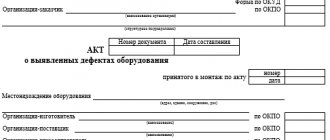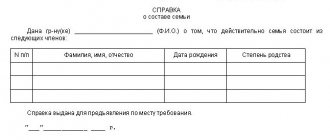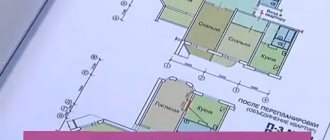Several years ago, some changes were made to Russian legislation, thanks to which low-income families had the opportunity to improve their living conditions with the support of the state.
Dear readers! The article talks about typical ways to resolve legal issues, but each case is individual. If you want to find out how to solve your particular problem , contact a consultant:
+7 (499) 938-81-90 (Moscow)
+7 (812) 467-32-77 (Saint Petersburg)
8 (800) 301-79-36 (Regions)
APPLICATIONS AND CALLS ARE ACCEPTED 24/7 and 7 days a week.
It's fast and FREE !
The Housing Code in force on the territory of the Russian Federation contains a list of persons who have the right to receive a free housing subsidy.
It includes the category of people in need of improved housing conditions, who are forced to use premises that are unsuitable for living and cannot be repaired.
The following can also take advantage of the state subsidy:
- citizens with serious illnesses;
- children and orphans deprived of parental care.
What it is?
To take advantage of government support, citizens must:
- prepare a package of documentation, which must necessarily include a certificate of verification of living conditions;
- stand in line for those in need of improved housing conditions (based on Article 52 of the RF Housing Code).
Citizens must submit all collected documents to the social assistance and support authority located at their place of residence.
Here you can download a sample application for registration of those in need of improved housing conditions.
A certificate of inspection of living conditions is issued after the commission has carried out an inspection, after which a corresponding act is drawn up, in which all comments and identified deficiencies are included.
The act is signed:
- authorized persons;
- an applicant or an interested person (their interests may be represented by proxies).
In this document:
- describes the general condition of the property;
- the level of its improvement and the presence of functioning utilities are assessed (a detailed list is made);
- describes the type of heating system, etc.
The commission may refuse to issue an act and certificate of inspection of housing conditions.
This decision of the body authorized to conduct inspections of residential premises is due to an incorrectly drawn up application.
A written refusal may be caused by improper treatment (the package of documents was submitted by a person who does not have legal grounds to represent the interests of a citizen who needs to improve their living conditions).
Why is it necessary?
Russian citizens may need a certificate of verification of living conditions in various situations:
- Most often, this document is drawn up at the personal request of people who want to improve their living conditions through participation in a government program.
- Also, such a certificate may be requested by the guardianship authorities if they have reason to believe that minor children live in premises unsuitable for use.
- A certificate of verification of living conditions is required by the court when considering adoption cases.
Many Russian citizens have a question about where to get this document and what official procedure precedes its issuance.
Drawing up an inspection report on the family’s living conditions
Family living conditions are checked by:
- to participate in state support programs for the poor and those in need of housing;
- to receive subsidies for utility services;
- to check the living conditions of citizens, especially socially vulnerable ones.
Regarding the residence of citizens
Most often, residential buildings are examined for children, incapacitated, elderly, and disabled people.
The purpose of the inspection is to find out whether conditions for decent maintenance, education, recreation, study, and physical and moral development of citizens are provided.
This is required:
- in court, when considering issues about the child’s place of residence after divorce, deprivation or restoration of parental rights, adoption;
- for the departments of guardianship and trusteeship (OOiP) when checking whether children are in parental care or whether the state should intervene in the family situation;
- if the child is registered with the police due to unsatisfactory behavior at school, aggression, commission of administrative offenses or crimes;
- for POiP when checking new household and social living conditions of a minor after moving to a new address;
- upon a complaint from a doctor or neighbors about the child’s condition or behavior.
Composition of the commission
As a rule, inspections of reinforced concrete structures are carried out by several officials. A commission of 3 or more people is formed depending on the purpose of the inspection.
If a child is registered with the police, it includes:
- Ministry of Internal Affairs officer, district police officer;
- OOiP employee;
- teacher;
- representative of the school's parent committee, etc.
To resolve family disputes, the commission may include employees of the cadastral chamber (Rosreestr) or HOA. If we are talking about registering as those in need of housing, a representative of the social protection authorities is involved.
Only POiP workers have the right to conduct an examination alone, for example, when inspecting a new place of residence of minors.
Rules
During an inspection, the commission or an authorized specialist draws up an inspection report.
Inspectors receive information about living conditions not only during a visual inspection of the residential premises, but also:
- from conversations with family members and minors;
- survey of neighbors, HOA officials, responsible residents;
- studying documents, for example, receipts for payment of housing and communal services;
- familiarization with school work, notebooks, diaries, the results of his creativity, hobbies, etc.
Based on the collected data, an act is formed. The family in respect of whom the examination was carried out has the right to familiarize itself with it.
The commission’s conclusion can be challenged within 10 days in the organization that ordered or conducted the inspection.
Features of the procedure
The commission may not provide notice of a planned inspection. As a rule, the inspection comes suddenly. Notifications are sent only by social protection departments if the family claims the status of those in need of housing improvement.
Certificate of inspection of living conditions
The certificate of inspection of living conditions is a form in a standard form.
This document indicates the applicant’s personal data, describes in detail the property being inspected, and includes the signatures of all persons present during the inspection.
Reference:
- attached to the documentation package;
- transferred to the local social assistance department for the citizen to receive a free subsidy issued by the state.
Those in need of improved housing conditions can be removed from the waiting list on the grounds specified in the Housing Code of the Russian Federation. How to apply for improved housing conditions? See here.
Where to get it?
To obtain a certificate of verification of living conditions, Russian citizens should contact the housing inspectorate.
At the initial reception, a person who wants to improve their housing must submit a corresponding application. He must have documents with him through which the responsible specialist can identify his identity.
After the application is accepted, a commission is created in the housing office, which includes several highly qualified specialists.
As soon as the composition of the commission has been approved by the management of the office, inspectors go to the address specified in the application and conduct an inspection of living conditions.
At the inspection site, a corresponding act is drawn up and given to the applicant for signature.
In accordance with the legislation in force in the Russian Federation, housing inspectors are allocated 10 working days to conduct inspections of real estate.
After all parties have signed the act of checking living conditions, the responsible specialist must:
- register it within 24 hours;
- call the applicant to the housing inspection to hand over a copy of the document.
A copy of the act is issued to citizens against signature or can be sent by registered mail with notification.
After issuing the act, the housing inspector can begin filling out a certificate confirming the inspection of the applicant’s living conditions, which is issued at the place of request.
Form
Many citizens who are collecting a package of documentation to apply for a free housing subsidy are faced with the problem of obtaining a certificate of verification of housing conditions.
This document is issued by the body authorized to conduct inspections of residential premises. The certificate form can be found at stands located at the relevant authorities.
The housing verification certificate form can be downloaded here.
Who issues?
A certificate of inspection of living conditions is issued by the authority authorized to conduct such inspections. In each locality, under the administration, state housing inspections should be created.
Citizens contact them:
- collecting documents to receive a housing subsidy;
- who need a certificate stating that their premises are not suitable for use.
The state offers a social program to improve living conditions for single mothers. What is deliberate deterioration of living conditions? Read here.
How can a large family improve their living conditions? Details in this article.
When is a housing inspection report needed?
Each apartment, house and other residential premises must comply with the technical, sanitary and epidemiological standards specified in SanPiN and SNIP. In order to check how specifically the target property is in accordance with the specified standards, special inspections are carried out. Based on their results, this act/certificate is drawn up.
One of the main purposes of the act is to indicate whether the family living in the apartment needs to improve their living conditions or not.
Main features specific to this document:
- The content can describe not only the actual living conditions, but also some important points, such as the balance of debt for utilities, the presence of pets, the quality of the child’s education, and so on.
- The report can be drawn up during a scheduled or unscheduled inspection. The owner is warned about the first in advance, but the second option, as the name suggests, is carried out suddenly. The first option is more typical for people who have become registered with the state to improve their living conditions; the second option is more often used when it is necessary to prove or disprove the fact that the family is dysfunctional.
- An inspection (and execution of an act) can be ordered by both government agencies (for example, the guardianship service or even the school director), and directly by the residents of the target apartment themselves.
- You can try to appeal the results of the inspection and, in fact, the act itself to the Housing Inspectorate (housing inspection). In such a situation, a re-inspection will be carried out. And you can also try to appeal it.
In addition to reflecting the actual living conditions, the act may often also contain recommendations for residents, according to which they can try to improve their living conditions.
There are three main “categories” of living conditions, depending on how well the housing complies with the standards and requirements reflected in the legislation.
Unsatisfactory
Such apartments include real estate that is completely or predominantly unsuitable for habitation.
For example, it may have high humidity, fungus, partially collapsing walls, lack of important communications (electricity, water, gas, sewerage, and so on).
Also unsatisfactory are the living conditions of families with low income, low social responsibility, and so on.
Example: Unsatisfactory living conditions can include both an apartment in which there is always high humidity, mildew and mold, which cannot be gotten rid of, as well as completely normal housing inhabited by a family that actively and constantly uses alcohol and/or drugs . Much depends on who exactly the audit is being conducted for. Most often, the test is common to everyone, but sometimes it is carried out “from the point of view” of the child. For example, when requested from a school or guardianship authorities.
If you have an “unsatisfactory” status, the probability of registering and getting new, more comfortable housing is quite high, provided that this status is not a consequence of the characteristics of people’s lives (alcoholism or drug addiction), but is a result of the characteristics of the building itself (for example, an old house, in disrepair).
Satisfactory living conditions
The most common option. It assumes the presence of completely normal housing, in an ordinary house, with all the necessary communications connected, a normal level of income, and the presence of all the necessary equipment and furniture.
Despite the fact that living in such an apartment is considered acceptable, the likelihood of registering and getting more comfortable housing still remains, provided that the application for this is a consequence of normal actions.
Example: Parents and their son lived in the same apartment. The son grew up and got married. I brought my wife to my parents’ apartment, because my wife’s parents have an even worse housing situation (for example, a 1-room apartment instead of a 2-room apartment). Let's assume that the apartment in which the parents, son and wife live has an area of 60 sq.m. Each resident has 15 sq.m.
, which is quite normal for most regions. After the birth of a child, the newlyweds will have about 12 sq.m. per person, which is not enough for a more or less comfortable stay.
Despite the fact that all registered persons can continue to live quite normally in this apartment and its status will remain at the “satisfactory” level, newlyweds have the right to register and receive new housing.
Such housing is much less common and usually refers to expensive new buildings. Typically, comfortable includes not just a well-furnished apartment equipped with high-quality appliances, but housing that includes video surveillance, a concierge, shops within walking distance, a playground in the courtyard, secure parking for residents, and so on.
Most often, “comfort” also refers to the area available for each of the residents. As a result, the likelihood of registering and getting new, even better housing tends to zero.
You can order and obtain a certificate of examination of the living conditions and financial security of the family from the social protection authorities.
At the same time, as mentioned above, other structures, including even the Ministry of Internal Affairs (Ministry of Internal Affairs), can initiate the inspection.
Since in different regions different structures (by name) may be responsible for completing the application and verification, it makes sense to contact the local administration first. They will tell you who issues such a document.
How to obtain a certificate of examination
In order to obtain this certificate of living conditions, you need to follow fairly simple instructions. Let's consider the question in more detail.
Procedure
Instructions for obtaining a certificate:
- Contact the local administration and check the social security contacts (this point can be skipped if the applicant knows where the social security is located).
- Contact the social security authorities and submit an application for verification.
- Receive a receipt confirming that the application has been accepted and will be considered.
- After this, a special commission is assembled to consider the application.
- Based on the results of the commission meeting, a date and time for the inspection are set, and the applicant is informed about it.
- At the specified time, the applicant is obliged to provide access to the residential premises.
- An inspection is carried out, which includes not only an inspection of the property, but also communication with neighbors, family members of the applicant, responsible representatives of the housing office or management company (management company), local police officer, and so on.
- An inspection report on living conditions is drawn up.
- The document bears the signatures of the applicant, his family members, as well as all members of the commission that conducted the inspection.
- The act is fully drawn up, stamps are affixed and the document is registered. Only after this one of the copies is given to the applicant.
Documentation
There is no strictly defined list of documents that may be required when submitting an application. Much depends on the purpose of the examination and other features. For example, an act that is drawn up for a preschool educational institution (preschool educational institution) will differ from an act that is drawn up for guardianship or for a school. A sample list of papers might look like this:
- Documents for real estate (extract from the Unified State Register of Real Estate, purchase and sale agreement, privatization, donation, and so on).
- Passports of the applicant and all residents. If you don't have a passport yet, a birth certificate will do.
- Registration certificate for the apartment.
- Certificate of income (2-NDFL) and so on.
The inspection organization can order a significant part of the documents, for example, characteristics of parents from the police or a child from school.
This type of check is absolutely free. Any costs associated with this can only be incurred if the applicant has lost any documents and must restore them. In addition, if you have to go to court, you will need to pay for state fees, lawyers, and so on.
Sample filling
When you visit the city administration where the housing inspection has been created, you can see a sample of filling out a certificate of inspection of housing conditions.
Usually completed forms marked “sample” are posted on information stands.
Here you can download a sample of filling out a certificate of verification of living conditions.
1. The applicant has the right to file a pre-trial (out-of-court) complaint against the decisions and (or) actions (inactions) taken (performed) in the provision of public services by the State Budgetary Institution of the MFC of the city of Moscow, the State Public Institution of Information Technology, and their employees. 2. The filing and consideration of complaints is carried out in the manner established by Chapter 2.1 of the Federal Law of July 27, 2010 N 210-FZ “On the organization of the provision of state and municipal services”, the Regulations on the specifics of filing and consideration of complaints about violations of the procedure for the provision of public services in the city of Moscow , approved by Decree of the Moscow Government of November 15, 2011 N 546-PP “On the provision of state and municipal services in the city of Moscow”, Regulations. 3. Applicants may file complaints in the following cases: 3.1. Violations of the deadline for registering a request (application) and other documents necessary for the provision of public services, as well as the procedure for processing and issuing a receipt for receiving a request and other documents (information) from the applicant. 3.2. Requirements from the applicant: 3.2.1. Documents, the submission of which by the applicant for the provision of public services is not provided for by the regulatory legal acts of the Russian Federation and the city of Moscow, including documents obtained using interdepartmental information interaction. 3.2.2. Applications for the provision of services not included in the list of services approved by the Moscow Government that are necessary and mandatory for the provision of public services. 3.2.3. Payment of fees for the provision of public services not provided for by regulatory legal acts of the Russian Federation and the city of Moscow. 3.3. Violations of the deadline for the provision of public services. 3.4. Refusal to the applicant: 3.4.1. In accepting documents, the submission of which is provided for by the regulatory legal acts of the Russian Federation and the city of Moscow for the provision of public services, on grounds not provided for by the regulatory legal acts of the Russian Federation and the city of Moscow. 3.4.2. In the provision of public services on grounds not provided for by the regulatory legal acts of the Russian Federation and the city of Moscow. 3.4.3. In the correction of typographical errors and errors in documents issued as a result of the provision of public services, or in case of violation of the established deadline for such corrections. 3.5. Other violations of the procedure for providing public services established by regulatory legal acts of the Russian Federation and the city of Moscow. 4. Complaints about decisions and (or) actions (inaction) of MFC employees are considered by the director (authorized deputy director) of the State Budgetary Institution of the MFC of the city of Moscow. Complaints against decisions and (or) actions (inaction) of the director (authorized deputy director) of the State Budgetary Institution MFC of the city of Moscow, accepted on complaints received in a pre-trial (extrajudicial) manner, are considered by the Office of the Mayor and the Government of Moscow. 5. Complaints about decisions and (or) actions (inaction) of employees of the State Property Management Committee are considered by the heads (authorized deputy heads) of the specified organizations. Complaints against decisions and (or) actions (inaction) of the heads of the State Property Management Committee, including decisions made by them or their deputies on complaints received in a pre-trial (extrajudicial) manner, are considered by the prefectures of the relevant administrative districts of the city of Moscow. 6. Complaints can be submitted to the executive authorities of the city of Moscow and organizations subordinate to them authorized to consider them in accordance with these Regulations (hereinafter referred to as the bodies and organizations authorized to consider complaints), in writing on paper, in electronic form in one from the following methods: 6.1. Upon personal application by the applicant (applicant’s representative). 6.2. By post. 6.3. Using the Portal of state and municipal services (functions) of the city of Moscow. 6.4. Using the official websites of bodies and organizations authorized to consider complaints on the Internet. 7. The complaint must contain: 7.1. The name of the body (organization) authorized to consider the complaint or the position and (or) last name, first name and patronymic (if any) of the relevant official to whom the complaint is sent. 7.2. The name of the executive authority of the city of Moscow, an organization subordinate to the executive authority, a multifunctional center for the provision of public services, or the position and (or) surname, first name, patronymic (if any) of the official, civil servant, employee, decisions and (or) actions (inaction) ) which are being appealed. 7.3. Last name, first name, patronymic (if available), information about the place of residence of the applicant - an individual or name, information about the location of the applicant - a legal entity, as well as contact telephone number(s), email address(es) (if available) and postal address to which the response should be sent to the applicant. 7.4. The date of submission and registration number of the request (application) for the provision of a public service (except for cases of appealing the refusal to accept the request and its registration). 7.5. Information about decisions and (or) actions (inactions) that are the subject of appeal. 7.6. Arguments on the basis of which the applicant does not agree with the appealed decisions and (or) actions (inactions). The applicant may submit documents (if any) confirming the applicant’s arguments, or copies thereof. 7.7. Applicant's requirements. 7.8. List of documents attached to the complaint (if any). 7.9. Date of filing the complaint. 8. The complaint must be signed by the applicant (his representative). If a complaint is filed in person, the applicant (applicant's representative) must provide an identification document. The authority of the representative to sign the complaint must be confirmed by a power of attorney issued in accordance with the legislation of the Russian Federation. The powers of a person acting on behalf of an organization without a power of attorney on the basis of the law, other regulatory legal acts and constituent documents are confirmed by documents certifying his official position, as well as the constituent documents of the organization. The status and powers of legal representatives of an individual are confirmed by documents provided for by federal laws. 9. A received complaint must be registered no later than the working day following the day of receipt. 10. The maximum period for consideration of a complaint is 15 working days from the date of its registration. The period for consideration of the complaint is 5 working days from the date of its registration in cases of appeal by the applicant: 10.1. Refusal to accept documents. 10.2. Refusal to correct typos and errors made in documents issued as a result of the provision of public services. 10.3. Violations of the deadline for correcting typos and errors. 11. Based on the results of consideration of the complaint, a decision is made to satisfy the complaint (in whole or in part) or to refuse to satisfy the complaint. 12. The decision must contain: 12.1. The name of the body or organization that considered the complaint, position, surname, first name, patronymic (if any) of the official who made the decision on the complaint. 12.2. Details of the decision (number, date, place of adoption). 12.3. Last name, first name, patronymic (if any), information about the place of residence of the applicant - an individual or name, information about the location of the applicant - a legal entity. 12.4. Last name, first name, patronymic (if any), information about the place of residence of the applicant’s representative who filed the complaint on behalf of the applicant. 12.5. Method of filing and date of registration of the complaint, its registration number. 12.6. Subject of the complaint (information about the decisions, actions, or inactions being appealed). 12.7. The circumstances established during the consideration of the complaint and the evidence confirming them. 12.8. Legal grounds for making a decision on a complaint with reference to the applicable regulatory legal acts of the Russian Federation and the city of Moscow. 12.9. The decision taken on the complaint (conclusion on the satisfaction of the complaint or refusal to satisfy it). 12.10. Measures to eliminate identified violations and deadlines for their implementation (if the complaint is satisfied). 12.11. Procedure for appealing a decision. 12.12. Signature of the authorized official. 13. The decision is made in writing using official forms. 14. The measures to eliminate identified violations specified in the decision include: 14.1. Cancellation of previously made decisions (in whole or in part). 14.2. Ensuring the acceptance and registration of the request, execution and issuance of a receipt to the applicant (in case of evasion or unreasonable refusal to accept documents and their registration). 14.3. Ensuring registration and delivery to the applicant of the result of the provision of a public service (in case of evasion or unreasonable refusal to provide a public service). 14.4. Correction of typos and errors made in documents issued as a result of the provision of public services. 14.5. Refund to the applicant of funds, the collection of which is not provided for by the regulatory legal acts of the Russian Federation and the city of Moscow. 15. The body or organization authorized to consider the complaint refuses to satisfy it in the following cases: 15.1. Recognition of the appealed decisions and (or) actions (inactions) as legal and not violating the rights and freedoms of the applicant. 15.2. Filing a complaint by a person whose powers have not been confirmed in the manner established by regulatory legal acts of the Russian Federation and the city of Moscow. 15.3. The applicant does not have the right to receive public services. 15.4. Availability: 15.4.1. A court decision on the applicant’s complaint with identical subject matter and grounds that has entered into legal force. 15.4.2. Decisions on a complaint made earlier in a pre-trial (out-of-court) manner in relation to the same applicant and on the same subject of the complaint (except for cases of appealing previously made decisions to a higher authority). 16. The complaint must be left unanswered on its merits in the following cases: 16.1. The presence in the complaint of obscene or offensive language, threats to the life, health and property of officials, as well as members of their families. 16.2. If the text of the complaint (part of it), last name, postal address and email address are not readable. 16.3. If the complaint does not indicate the name of the applicant (the applicant's representative) or the postal address and email address to which the response should be sent. 16.4. If the body or organization authorized to consider the complaint received a request from the applicant (the applicant’s representative) to withdraw the complaint before a decision on the complaint is made. 17. The decision to satisfy the complaint or to refuse to satisfy the complaint is sent to the applicant (the applicant’s representative) no later than the working day following the day of its adoption, to the postal address specified in the complaint. At the request of the applicant, the decision is also sent to the email address specified in the complaint (in the form of an electronic document signed with the electronic signature of an authorized official). In the same manner, the applicant (the applicant’s representative) is sent a decision on the complaint, in which only an email address is indicated for the response, and the postal address is missing or cannot be read. 18. If the complaint is left unanswered on the merits, the applicant (his representative) is sent, no later than the working day following the day of registration of the complaint, a written motivated notification indicating the grounds (except for cases where the complaint does not indicate a postal address and email address email for a response or they are unreadable). The notice is sent in the manner established for sending a decision on a complaint. 19. A complaint filed in violation of the rules on competence established by paragraphs 5.4-5.6 of the Regulations is sent no later than the working day following the day of its registration to the body authorized to consider the complaint, with simultaneous written notification to the applicant (his representative) about forwarding the complaint (except for cases where the complaint does not indicate the postal address and email address for response or they are not legible). The notice is sent in the manner established for sending a decision on a complaint. 20. Filing a complaint in a pre-trial (out-of-court) manner does not exclude the right of the applicant (applicant’s representative) to simultaneously or subsequently file a complaint with the court. 21. Informing applicants about the judicial and pre-trial (extrajudicial) procedure for appealing decisions and (or) actions (inactions) committed in the provision of public services should be carried out by: 21.1. Placing relevant information on the Portal of state and municipal services (functions) of the city of Moscow, information stands or other sources of information in places where public services are provided. 21.2. Consulting applicants, including by telephone, email, and in person. 22. If, during or as a result of consideration of a complaint, signs of an administrative offense or crime are established, the official empowered to consider the complaint immediately forwards the available materials to the prosecutor’s office. If violations of the procedure for the provision of public services of the city of Moscow are identified, the responsibility for which is established by the Code of the City of Moscow on Administrative Offenses, the official empowered to consider the complaint must also send copies of the available materials to the Main Control Department of the city of Moscow within two working days following after the day the decision on the complaint was made (but no later than the working day following the day of expiration of the period established by federal legislation for consideration of complaints about violations of the procedure for the provision of public services).







